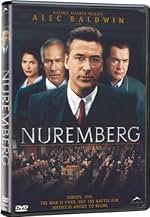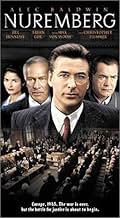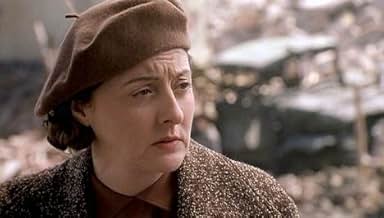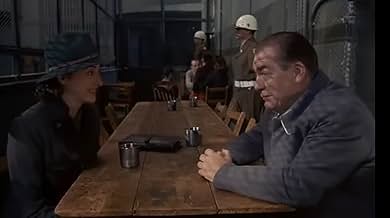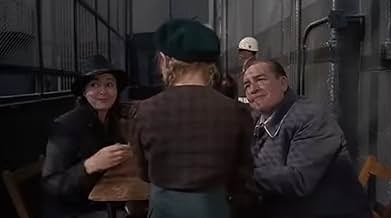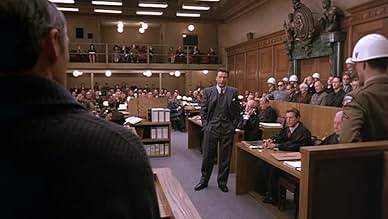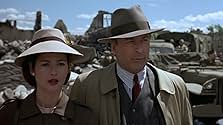The dramatized account of the war crime trials following the defeat of Nazi Germany in World War II.The dramatized account of the war crime trials following the defeat of Nazi Germany in World War II.The dramatized account of the war crime trials following the defeat of Nazi Germany in World War II.
- Won 2 Primetime Emmys
- 10 wins & 33 nominations total
Browse episodes
Featured reviews
Brian Cox picks this mini-series up by the scruff of the neck and runs off with it. It is an amazing testimonial to his talent and his craft that he suceeds in making Field Marshall Hermann Goerring the most appealing and charming character in this rehash of the Nuremburg trials. His "seduction" of the young American non-com is not only plausible but gratifying. It is amazing that this performance has one cheering on the second in command of the Third Reich as he cheats the hangman's noose.
I was only a teenager when the Nuremberg trials began, and I (as most other people throughout the world) had very little true knowledge of the horror stories of the victims of Nazi atrocities. When the truth burst upon the world, many people could not believe what they saw. (Some neo-nazi fools still deny everything.)
This is not an easy film to watch, especially with actual films of the frightful deathcamps, but one is drawn into the story because it was such a momentous event - that the major Allies of WWII united to have fair and open trials not just of single criminals, but of an evil governmental system.
Alec Baldwin has done a magnificent job in his role as Robert Jackson, who was the Chief Prosecutor. I wish I could thank him, as co-producer of this fine mini-series, for such a vivid rendering of those years.
Yes, there are still horrors being perpetrated on innocent victims in many parts of the world today, but the world IS watching, and in many cases, is resisting these evil governments.
I suggest that it is of UTMOST IMPORTANCE that young people today watch this film. Too many young (and many older) people think of WWII as only a rather heroic glorious time; I want them to know what some human beings were doing to other innocent victims. Believe me it is NOT boring. Yes, there were many, many heroes. I know. I married a young man who had fought with the Greek resistance movement and suffered greatly, but his spirit, as that of many others, could not be conquered. We must not forget!
This is not an easy film to watch, especially with actual films of the frightful deathcamps, but one is drawn into the story because it was such a momentous event - that the major Allies of WWII united to have fair and open trials not just of single criminals, but of an evil governmental system.
Alec Baldwin has done a magnificent job in his role as Robert Jackson, who was the Chief Prosecutor. I wish I could thank him, as co-producer of this fine mini-series, for such a vivid rendering of those years.
Yes, there are still horrors being perpetrated on innocent victims in many parts of the world today, but the world IS watching, and in many cases, is resisting these evil governments.
I suggest that it is of UTMOST IMPORTANCE that young people today watch this film. Too many young (and many older) people think of WWII as only a rather heroic glorious time; I want them to know what some human beings were doing to other innocent victims. Believe me it is NOT boring. Yes, there were many, many heroes. I know. I married a young man who had fought with the Greek resistance movement and suffered greatly, but his spirit, as that of many others, could not be conquered. We must not forget!
This is a strange subject for a modern TV series designed to entice an audience to whom World War II is as distant as the Pelopenesian Wars. Yet this is a tough, well produced, historically accurate and thoroughly compelling film. Brian Cox steals the show with a masterful recreation of Hermann Goering as a beguiling rogue. And the production techniques excel, for example the sound track as silent film of the concentration camps is shown to the trial. It puts the horror in context without exploiting it or sensationalizing it. A brilliant piece of historical film making.
`Nuremburg' is a chilling and disturbing look at the Nuremberg trial of Nazi war criminals after WWII. The story is historically accurate and captures the political and psychological climate of the times. It also serves as a distressing reminder to a young generation that has not experienced war in its lifetime of the horrors of which humanity is capable.
The film examines a number of fascinating angles of the trial. Instead of just focusing on the trial itself (of which there is plenty), it also offers a look at the political rivalry and infighting of the victorious nations, and a number of character studies of the prisoners. The most prominently portrayed of these is Hermann Göring (Brain Cox), Reich Marshall of the Third Reich and a member of Hitler's inner circle. Göring is portrayed as a cunning and charismatic adversary, who almost succeeds at making a sham of the entire trial.
The haunting question that must pervade anyone's mind that ponders the atrocities that occurred in WWII Germany is verbalised in the film by Elsie Douglas (Jill Hennessey). She says, `How could civilised human beings ever do that to other civilised human beings?', to which Justice Jackson (Alec Baldwin) replies, "Maybe civilization is overrated." This film provides some insight into the motivation of the German leaders, examining the warped perspective of the perpetrators who attempt to rationalise the horrors they committed to themselves and to the court. They point to the German sense of duty and obedience that is ingrained into their culture. After all, they were only following orders. There is also the undercurrent of Hitler's ruthlessness in using the SS to eliminate all opposition. In a particularly lucid moment, Göring says that if you look up and down the cellblock all you see is `yes men' because all the `no men' are six feet underground. Göring also points out the hypocrisy of the criticism of German hatred of the Jews by a U.S. society that interred millions of Japanese citizens, and tolerates segregation and hate-crimes against blacks.
Certainly, this is no justification for the systematic annihilation of 10 million of their own citizens, and as the film progresses a number of the prisoners begin to express deep remorse for their actions. Still, it shows that these weren't a group of sociopathic monsters in the conventional sense. They were otherwise normal men who had accomplished the inconceivable by dehumanising their victims to the point where the horrors they committed every day were no more disturbing to them than hunting deer to trim the herd. This is the most frightening thought of all, because it portends the possibility that such unthinkable acts could happen again. As long as we are able to believe that these men were a gaggle of homicidal maniacs, a freak societal aberration, we can reassure ourselves that this couldn't ever recur. However, when it dawns on us that normal people are able to rationalize such behaviour, we realise that under the right circumstances the potential for such inhumanity always exists. Complacency is an inadvertent ally of oppression, and this film should shock even the most casual viewer out of it. In this regard, it is instructive and enlightening.
The direction by Yves Simoneau is excellent and rises well above his mostly TV credits. The mood of the period is realistically rendered with a great deal of period accuracy. The costumes and period props are excellent with an eye for detail. He does an outstanding job creating background reaction shots, especially among the prisoners, that show their sarcastic disdain for their captors and display their smug superiority. He brings great power to numerous scenes using various camera angles. The holocaust footage used is some of the most disconcerting and inclusive I have ever seen. If there is any criticism to be leveled against the crafting of this film, it is that it delved too deeply into minutia, especially the sexual undercurrents between Jackson and Elsie Douglas. However, given the fact that it was produced as a TNT miniseries, the director was forced to fluff it up for the additional runtime.
The acting is also outstanding. Alec Baldwin gives a solid performance as Robert Jackson, a man obsessed with justice. Baldwin has never been known for his passion, but he elevates his game in certain parts of this film. Jill Hennessey is also excellent as Elsie, rendering her as a tough and smart woman who is a guiding force in the entire proceeding. However, by far the best performance is delivered by Brain Cox as Göring. His is a brilliant and complex performance that brings the reprehensible and magnetic Nazi leader to life in a way that is both attractive and loathsome. Colm Feore also gives a spine tingling performance as Rudolf Höss, the Commandant of Auschwitz concentration camp, who cavalierly discusses the efficiency techniques of eliminating prisoners, with the cold precision of an industrial engineer.
This terrific drama rises far above its TV roots. I rated it a 9/10. It is important viewing which reminds us that we cannot become complacent about tyranny, and we must be ever vigilant to guard against its recurrence.
The film examines a number of fascinating angles of the trial. Instead of just focusing on the trial itself (of which there is plenty), it also offers a look at the political rivalry and infighting of the victorious nations, and a number of character studies of the prisoners. The most prominently portrayed of these is Hermann Göring (Brain Cox), Reich Marshall of the Third Reich and a member of Hitler's inner circle. Göring is portrayed as a cunning and charismatic adversary, who almost succeeds at making a sham of the entire trial.
The haunting question that must pervade anyone's mind that ponders the atrocities that occurred in WWII Germany is verbalised in the film by Elsie Douglas (Jill Hennessey). She says, `How could civilised human beings ever do that to other civilised human beings?', to which Justice Jackson (Alec Baldwin) replies, "Maybe civilization is overrated." This film provides some insight into the motivation of the German leaders, examining the warped perspective of the perpetrators who attempt to rationalise the horrors they committed to themselves and to the court. They point to the German sense of duty and obedience that is ingrained into their culture. After all, they were only following orders. There is also the undercurrent of Hitler's ruthlessness in using the SS to eliminate all opposition. In a particularly lucid moment, Göring says that if you look up and down the cellblock all you see is `yes men' because all the `no men' are six feet underground. Göring also points out the hypocrisy of the criticism of German hatred of the Jews by a U.S. society that interred millions of Japanese citizens, and tolerates segregation and hate-crimes against blacks.
Certainly, this is no justification for the systematic annihilation of 10 million of their own citizens, and as the film progresses a number of the prisoners begin to express deep remorse for their actions. Still, it shows that these weren't a group of sociopathic monsters in the conventional sense. They were otherwise normal men who had accomplished the inconceivable by dehumanising their victims to the point where the horrors they committed every day were no more disturbing to them than hunting deer to trim the herd. This is the most frightening thought of all, because it portends the possibility that such unthinkable acts could happen again. As long as we are able to believe that these men were a gaggle of homicidal maniacs, a freak societal aberration, we can reassure ourselves that this couldn't ever recur. However, when it dawns on us that normal people are able to rationalize such behaviour, we realise that under the right circumstances the potential for such inhumanity always exists. Complacency is an inadvertent ally of oppression, and this film should shock even the most casual viewer out of it. In this regard, it is instructive and enlightening.
The direction by Yves Simoneau is excellent and rises well above his mostly TV credits. The mood of the period is realistically rendered with a great deal of period accuracy. The costumes and period props are excellent with an eye for detail. He does an outstanding job creating background reaction shots, especially among the prisoners, that show their sarcastic disdain for their captors and display their smug superiority. He brings great power to numerous scenes using various camera angles. The holocaust footage used is some of the most disconcerting and inclusive I have ever seen. If there is any criticism to be leveled against the crafting of this film, it is that it delved too deeply into minutia, especially the sexual undercurrents between Jackson and Elsie Douglas. However, given the fact that it was produced as a TNT miniseries, the director was forced to fluff it up for the additional runtime.
The acting is also outstanding. Alec Baldwin gives a solid performance as Robert Jackson, a man obsessed with justice. Baldwin has never been known for his passion, but he elevates his game in certain parts of this film. Jill Hennessey is also excellent as Elsie, rendering her as a tough and smart woman who is a guiding force in the entire proceeding. However, by far the best performance is delivered by Brain Cox as Göring. His is a brilliant and complex performance that brings the reprehensible and magnetic Nazi leader to life in a way that is both attractive and loathsome. Colm Feore also gives a spine tingling performance as Rudolf Höss, the Commandant of Auschwitz concentration camp, who cavalierly discusses the efficiency techniques of eliminating prisoners, with the cold precision of an industrial engineer.
This terrific drama rises far above its TV roots. I rated it a 9/10. It is important viewing which reminds us that we cannot become complacent about tyranny, and we must be ever vigilant to guard against its recurrence.
Hidden inside this purported battle between surviving top Nazi Hermann Goering and American prosecutor Judge Robert Jackson is, I think, the adaptation the writer probably wanted to do - the story of psychologist G. M. Gilbert and his backstage verbal tusslings with men who either refused to acknowledge any guilt (Goering, Streicher) or conversely were overflowing with it (Frank, Speer).
When you see Alec Baldwin appear a second time in the credits, as Executive Producer, you feel that Nuremberg was probably conceived as a vanity project for him. Fortunately it is quite easy to let the early scenes of the Court's setup just wash over you, and of course Jill Hennessey is always easy on the eyes. Much of the first half of the first episode is more or less soap opera. Jackson has to persuade Judge Biddle to go to Nuremberg, then to relinquish the Presidency of the court to the British. The bantering relationship with his secretary (Hennessey) serves as a prelude to their becoming lovers during their time in Germany.
At this point Hermann Goering appears (the great Brian Cox on top form), totally dominating the trial, totally dominating this mini-series, and your attention is grasped and held. Cox almost wipes Baldwin off the screen. Unfortunately it's very hard not to gain a great deal of sympathy for Goering, particularly when he is with his family, or in the heart-to-heart chats with his G. I. prison guard, Tex. We see Goering as he undoubtedly saw himself, but in reality he wasn't like that at all. The Nuremberg trial and the general travails of imprisonment were an excellent opportunity for him to smarten himself up: prior to his arrest he had become a dissolute and overweight drug addict. Unfortunately no sign of this weakness of character was carried over into the script, leaving an impression of Goering as a noble, principled man - irrespective of whether you agreed with his principles.
Also very watchable was Matt Craven in the role of Gilbert the aforementioned psychologist, and Christopher Plummer as British prosecutor David Maxwell-Fyfe (although the real Maxwell-Fyfe was the younger prosecutor, not an elder mentor as depicted here). Particularly gratifying is the scene in which Maxwell-Fyfe tells Jackson that "your documentary approach is legally impeccable - but as drama it's absolutely stultifying" - which might stand as an apt description of Baldwin's part in this series.
A last little curiosity, and not to make any personal remarks about Herbert Knaup, but I did find it strange that they cast Knaup, a slightly odd-looking actor, to play Albert Speer, by fairly common consent the handsomest and most photogenic of all the Nazi leaders, particularly as Speer was portrayed here in a sympathetic light. Other than Knaup, many of the actors were very close in looks to their real-life counterparts, most notably Roc LaFortune as Rudolf Hess, almost a living double.
When you see Alec Baldwin appear a second time in the credits, as Executive Producer, you feel that Nuremberg was probably conceived as a vanity project for him. Fortunately it is quite easy to let the early scenes of the Court's setup just wash over you, and of course Jill Hennessey is always easy on the eyes. Much of the first half of the first episode is more or less soap opera. Jackson has to persuade Judge Biddle to go to Nuremberg, then to relinquish the Presidency of the court to the British. The bantering relationship with his secretary (Hennessey) serves as a prelude to their becoming lovers during their time in Germany.
At this point Hermann Goering appears (the great Brian Cox on top form), totally dominating the trial, totally dominating this mini-series, and your attention is grasped and held. Cox almost wipes Baldwin off the screen. Unfortunately it's very hard not to gain a great deal of sympathy for Goering, particularly when he is with his family, or in the heart-to-heart chats with his G. I. prison guard, Tex. We see Goering as he undoubtedly saw himself, but in reality he wasn't like that at all. The Nuremberg trial and the general travails of imprisonment were an excellent opportunity for him to smarten himself up: prior to his arrest he had become a dissolute and overweight drug addict. Unfortunately no sign of this weakness of character was carried over into the script, leaving an impression of Goering as a noble, principled man - irrespective of whether you agreed with his principles.
Also very watchable was Matt Craven in the role of Gilbert the aforementioned psychologist, and Christopher Plummer as British prosecutor David Maxwell-Fyfe (although the real Maxwell-Fyfe was the younger prosecutor, not an elder mentor as depicted here). Particularly gratifying is the scene in which Maxwell-Fyfe tells Jackson that "your documentary approach is legally impeccable - but as drama it's absolutely stultifying" - which might stand as an apt description of Baldwin's part in this series.
A last little curiosity, and not to make any personal remarks about Herbert Knaup, but I did find it strange that they cast Knaup, a slightly odd-looking actor, to play Albert Speer, by fairly common consent the handsomest and most photogenic of all the Nazi leaders, particularly as Speer was portrayed here in a sympathetic light. Other than Knaup, many of the actors were very close in looks to their real-life counterparts, most notably Roc LaFortune as Rudolf Hess, almost a living double.
Did you know
- GoofsAt the end of the trial, Field Marshall Wilhelm Keitel is referred to as "Admiral Keitel."
- Quotes
Reichsmarschall Hermann Wilhelm Göring: One German, a fine man. Two Germans, a bund. Three Germans, a war. One Englishman, an idiot. Two Englishmen, a club. Three Englishmen, an Empire.
- ConnectionsFeatured in The 58th Annual Golden Globe Awards 2001 (2001)
- SoundtracksDeep in the Heart of Texas
Written by June Hershey and Don Swander
Performed by cast
Melody Lane Music c/o Peermusic International
- How many seasons does Nuremberg have?Powered by Alexa
Details
- Release date
- Countries of origin
- Official site
- Languages
- Also known as
- Nürnbergprocessen
- Filming locations
- Production companies
- See more company credits at IMDbPro
- Runtime
- 1h 30m(90 min)
- Color
- Sound mix
- Aspect ratio
- 1.85 : 1
Contribute to this page
Suggest an edit or add missing content



